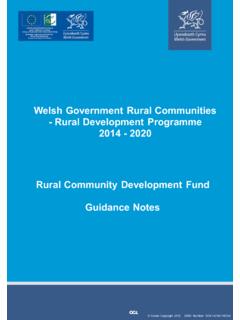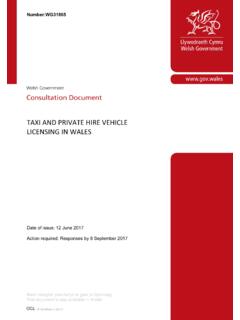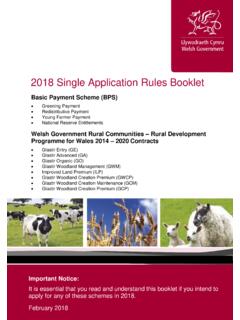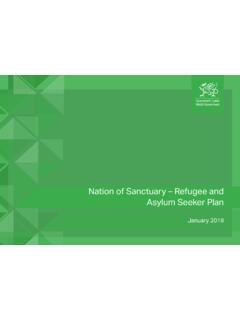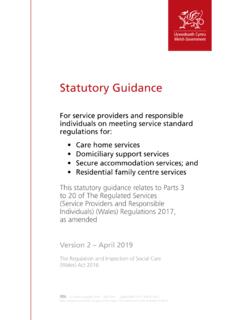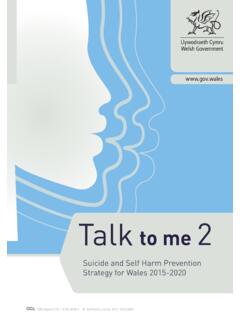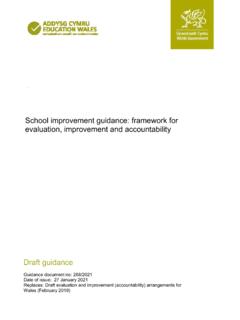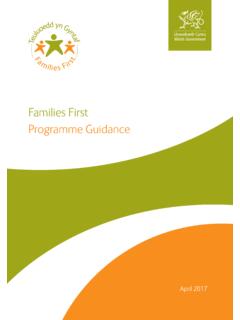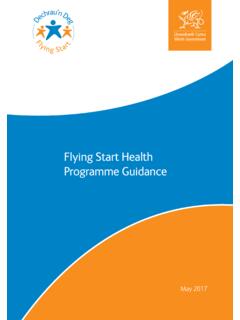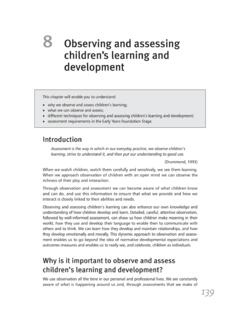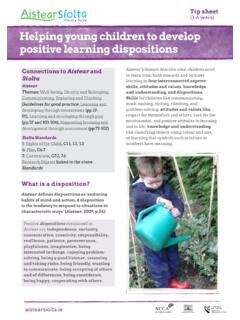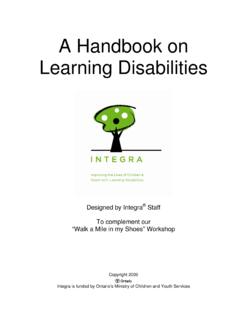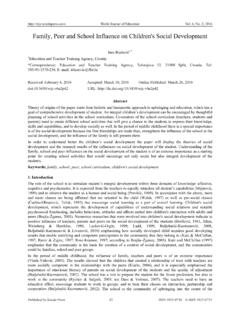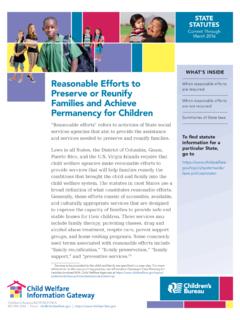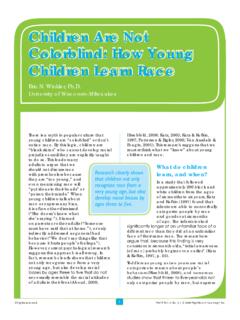Transcription of Talk With Me: Speech, Language and Communication (SLC ...
1 122 Audience: All professionals working across the children s sector with a focus on speech , Language and Communication (SLC) including: Royal College of speech and Language Therapists, Early Years Public Health Clinical Excellence Network (CEN), Wales Early Language Pathway Task and Finish Group, DLD Task and Finish Group, Multilingualism Clinical Excellence Group, Wales speech and Language Therapy Advisory Forum (WSLTAF), Midwifery, All Wales Health Visitors Forum, School Health Nurses, Public Health Wales, Psychology & Infant Mental Health Leads, Flying Start Leads Health Leads & Education Leads, Families First Leads Health Leads & Education Leads, Foundation Phase Professionals from Local Authorities and Regional Education Consortia, ALN Transformation Lead, Early Years Additional Learning Needs Lead Officer, ACES hub, Third Sector children in Wales, Barnardos, Save the children , Bookstart, Mudiad Meithrin, Social Care Wales, Cwlwm, PACEY, National Day Nurseries Association, Early Years Wales, Clybiau Plant Cymru Wales, Care Inspectorate Wales, Estyn, All Wales Head of children s Services (AWHOCS), The Fostering Network, Pupil Development Grant (PDG)
2 Advisers and Regional Education : This document covers the Welsh Government s national drive to promote SLC development, primarily aimed at children from 0 4 years, 11 months, but it does have relevance for the age range 0-25 years as covered in the Additional Learning Needs (ALN) Required: This document describes the Welsh Government s programme of work and arrangements to further promote and support SLC development throughout Wales. Further Information: Enquiries about this document should be directed to: children and Families Division Communities and Tackling Poverty Directorate, Welsh Government Cathays Park Cardiff CF10 3 NQTel: 03000 253344E-mail: Additional Copies: This document can be accessed from the Welsh Government s website at : The Welsh Government would like to thank Aneurin Bevan University Health Board and Scarlet Design for the use of its Talk with me images within this document.
3 Talk With Me: speech , Language and Communication (SLC) Delivery Plan33 ContentsThe Delivery Plan 17 Delivery plan Objective 1 20 Delivery plan Objective 2 22 Delivery plan Objective 3 23 Delivery plan Objective 4 24 Delivery plan Objective 5 26 Conclusion and Next Steps 29 Glossary 30 Ministerial Forward 4 Overview: Talk with Me 5 Introduction 8 Strategic Context 11 Covid 19 14 The way forward in Wales 15 Consultation Process 16 Talk With Me.
4 speech , Language and Communication (SLC) Delivery Plan4 Ministerial ForewordThe Welsh Government s ambition is for children from all backgrounds to have the best start in life and to reach their full is widely recognised that a child s development in the early years is vital. This includes children s acquisition of speech , Language and Communication (SLC) skills and oracy which underpins a child s ability to read and write and to problem-solve. Positive cognitive development is strongly associated with a child s success in school and entry into the child, irrespective of where they live or their family circumstances, might require additional support to address delays or difficulties with SLC. Our aim is to ensure that children throughout Wales have access to high quality universal, population, targeted and specialised support1 in the early years, if required, to develop their SLC skills.
5 Embracing Wales as a bilingual country, we also need to ensure that we provide the best possible start for all children to develop Welsh as well as English SLC skills in line with the vision set out in Cymraeg consequences of not supporting children s early Language skills, and not identifying long-term or persistent SLC needs are harmful enough to necessitate an overarching, cross-cutting response with strong are a number of drivers for SLC as a high profile policy area for the Welsh Government and we are taking steps to raise awareness of this crucial life See Glossary for definitionsA major step forward is the publication of Talk With Me: speech , Language and Communication (SLC) Delivery Plan which seeks to drive improvement in the way in which children in Wales are supported to develop their SLC skills.
6 This cross- cutting SLC delivery plan is the first of its kind in the United Kingdom. We have worked constructively with a wide range of stakeholders and they have helped us identify actions to better support our children s SLC development. This would not have been possible without the invaluable help of the Royal College of speech and Language Therapists (RCSLT) and the Early Years Public Health Clinical Excellence Network (CEN) for speech and Language Therapists. This cross Government delivery plan which includes a wide range of policy areas from Health to Employability and Skills, will lead to a more joined-up approach to engaging with families, and builds upon existing policies and what are proud to endorse the actions set out in this delivery plan that need to be taken collectively to tackle the challenging issues which exist and drive up improvements at collaboration at Ministerial level is essential to delivering improved outcomes.
7 Ministers and officials have worked collaboratively on this plan, and we will ensure that continues through the implementation must reach their full potential. We should not settle for anything less. 4 Vaughan Gething MS Minister for Health and Social ServicesJulie Morgan MS Deputy Minister for Health and Social Services Kirsty Williams MS Minister for EducationKen Skates MS Minister for Economy and Transport and North Wales Eluned Morgan MS Minister for Mental Health, Wellbeing and the Welsh Language Jane Hutt MS Deputy Minister and Chief WhipTalk With Me: speech , Language and Communication (SLC) Delivery Plan55 Overview: Talk with meSpeech, Language and Communication (SLC): Delivery Plan 2020 to 2022 The Welsh Government aims to raise awareness of the importance of SLC and ensure that interventions are delivered universally at the point of need.
8 Giving every child the best start in life is a key factor in reducing health inequalities. speech , Language and Communication (SLC) skills are essential for positive health, wellbeing, education and employment outcomes. Promoting SLC in the early years can reduce the impact of social disadvantage across the life course2. Effective oral Language skills are the building blocks on which subsequent literacy and numeracy development is based. Without solid foundations in Language and Communication skills, children run the risk of school failure, low self-esteem and poor social skills. Yet up to 80% of children in some areas of the UK are starting school without these vital skills. 3 2 Beard, 2018 3 ICAN, 2009 4 Bercow, 2018 5 Beard, 2018 6 Norbury et al, 2016 7 Law et al, 2013 8 Hart & Risley, 2003 The ability to understand and use Language is a fundamental life skill unique to humans which is partly innate and partly learned4.
9 Communication is a complex process consisting of a number of skills: Receptive Language (understanding) typically precedes expressive Language (spoken Language or talking); speech clarity is the way that words are spoken and Communication is how we interact with each other5. More than 10% of children and young people in the UK have long-term SLC needs which create barriers to Communication or learning in everyday life6. Research shows that children living in poverty suffer disproportionately from delayed language7. By this we mean, those children whose Language skills are developing significantly more slowly than those of other children of the same age but who do not have a specific disorder. Language skills are a critical factor in the intergenerational cycles that can perpetuate poverty, as poor Communication skills are passed down from parent to With Me: speech , Language and Communication (SLC) Delivery Plan6 Key facts9 Locke et al, 2002 10 Save the children , 2016 11 Law et al, 2010 12 Blanden, 2006 Over 50% of children in socially deprived areas may start school with impoverished speech , Language and Communication skills9.
10 One in four children who struggled with Language at age five did not reach the expected standard in English at the end of primary school, compared with one in 25 children who had good Language skills at age five10. Researchers have found that children who had normal non-verbal skills but a poor vocabulary at age 5 were, at age 34, one and a half times more likely to be poor readers or have mental health problems and more than twice as likely to be unemployed as children who had normally developing Language at age 511. Vocabulary at age 5 is found to be the best predictor (from a range of measures at age 5 and 10) of whether children who experienced social deprivation in childhood were able to buck the trend and escape poverty in later adult With Me: speech , Language and Communication (SLC) Delivery Plan7 speech , Language & Communication skills: why do they matter?
